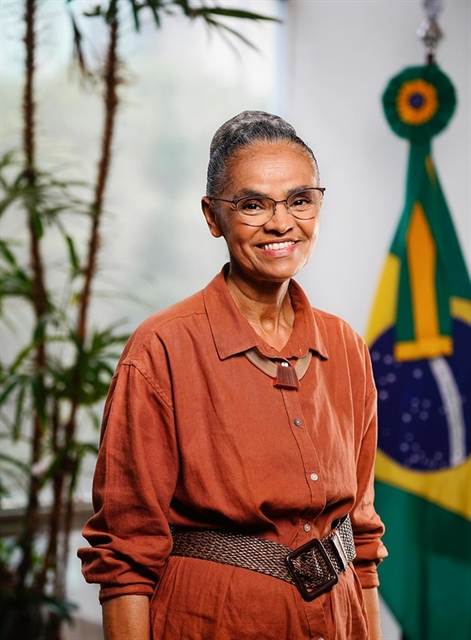 Society
Society
.jpg)
 |
| Minister of Environment and Climate Change of Brazil, Marina Silva |
Minister of Environment and Climate Change of Brazil, Marina Silva, talks to the press about Brazil’s priorities in the global fight against climate change and how partnerships with countries like Việt Nam can play a pivotal role in achieving shared environmental goals.
What areas that Việt Nam and Brazil can cooperate in promoting commitments in protecting environment and addressing climate change?
There are several promising areas where Brazil and Việt Nam can deepen cooperation. Both countries share a wealth of tropical ecosystems, rich biodiversity and the challenge of promoting inclusive development while protecting nature, making them natural partners in the global climate and environment agenda.
One key area is the development of innovative finance mechanisms to support forest conservation and sustainable use. Efforts are underway to design and structure new instruments that recognize the value of conserved forests and provide long-term incentives. A notable example is the Tropical Forests Forever Facility (TFFF), an international proposal to create a stable funding mechanism for tropical forest countries. The fund will provide direct payments per hectare of conserved or restored forest, offering predictable, performance-based support for countries that commit to long-term forest protection. Việt Nam, with its significant tropical forest cover, could be a strong partner and beneficiary of such mechanisms.
Another strategic area is ecosystem restoration. Brazil has committed, as part of its NDC, to restore 12 million hectares of degraded land by 2030. This ambitious effort sets opportunities for local development, job creation, and the promotion of sustainable, nature-based solutions. Vietnam’s leadership and best practices related to restoration interest Brazil and could be further explored bilaterally.
Brazil is also advancing forest concession models that allow for the restoration and productive recovery of degraded public lands. These models involve partnerships that combine environmental responsibility, long-term stewardship, and carbon credit generation. One example is the Bom Futuro National Forest, in the Brazilian Amazon, where ecological restoration is integrated with sustainable forest management. Vietnam’s own experiences with sustainable forestry could complement these efforts and foster valuable technical exchange.
In addition, Brazil holds important comparative advantages that can contribute to the global decarbonization effort. With 93% of its electricity matrix powered by renewables, Brazil has enormous potential to become a major producer of green hydrogen. In the field of biofuels, Brazil combines technological expertise in both metallic and biological engineering, allowing it to scale production without triggering new deforestation or undermining food security. This is yet another sector where Brazil and Việt Nam could expand bilateral cooperation, advancing climate goals while supporting inclusive economic growth.
Looking ahead to COP30, to be hosted by Brazil in 2025, there is a growing need for all countries to present enhanced, ambitious NDCs aligned with the 1.5 °C goal. Cooperation between Brazil and Việt Nam can help raise collective ambition – especially in sectors such as forests, agriculture, coastal resilience, renewable energy – while advancing a development model that is low-carbon, socially inclusive, and grounded in the protection and sustainable use of biodiversity.
Việt Nam will organise P4G Summit 2025 with the theme “Global Partnership for Inclusive, Sustainable, Innovative and People-Centered Green Transition”. What are your comments on the significance of this Summit in the current context?
The 2025 P4G Summit in Việt Nam, under the theme “Global Partnership for Inclusive, Sustainable, Innovative and People-Centered Green Transition”, will be important to foster international dialogue and cooperation while advancing concrete solutions to today’s most pressing challenges. At a time when the world faces the escalating impacts of climate change, biodiversity loss and desertification, land degradation, and droughts (DLDD) – alongside persistent poverty and inequality –, the Summit offers an opportunity to promote inclusive, science-based, and equity-driven transitions.
On the road to COP30 in Belém, Brazil invites all countries and stakeholders to engage not only in dialogue, but in the implementation of actions. The P4G Summit aligns closely with the 2030 Agenda for Sustainable Development and can help advance synergies among the three Rio Conventions on climate, biodiversity, and desertification, ensuring that integrated solutions are placed at the heart of the ecological transition.
In this context, it is essential to give greater prominence to adaptation, which speaks directly to the protection of life and the reduction of vulnerabilities at the local level. We must ensure that the communities most affected by climate impacts have access to resources and technology to build resilience. The transition to a low-carbon and climate-resilient economy must be not only rapid, but also just, ensuring sustainable economic alternatives and the means of implementation, particularly for the most vulnerable populations and ecosystems. No one can be left behind.
Vietnam’s leadership in convening the 2025 P4G Summit will be a milestone on the path to COP30, helping fair, people-centered, shared responsible actions and a vital discussion on a just and inclusive transition. VNS